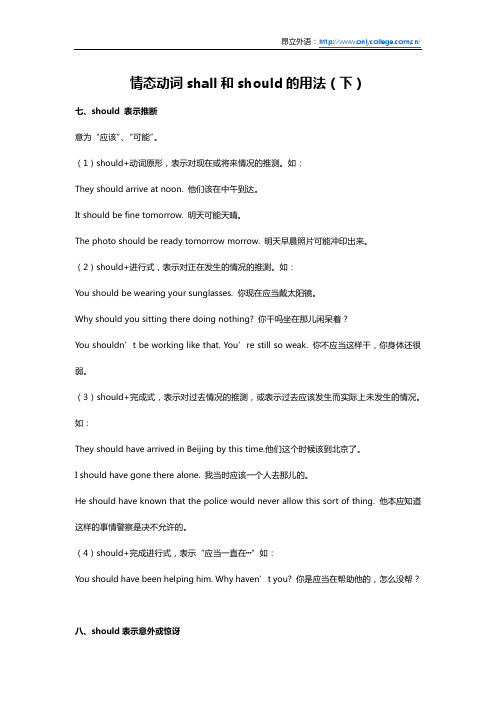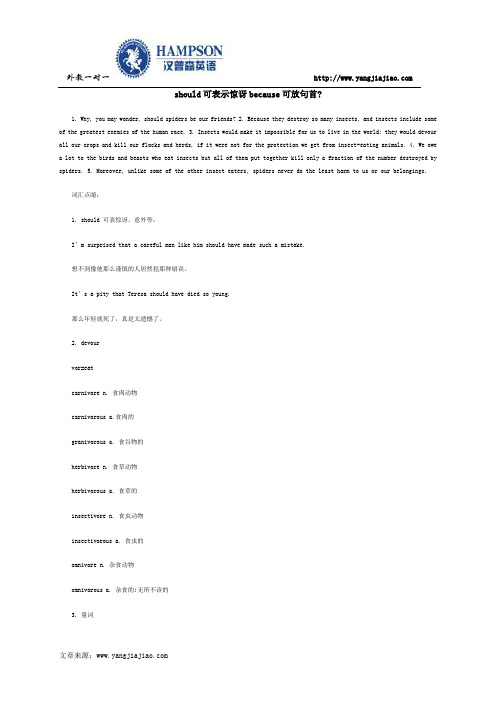高考英语 语法复习 用should表示“感到意外、吃惊”
- 格式:doc
- 大小:557.00 KB
- 文档页数:2

情态动词should“应该”
一、should的用法
1、should作为情态动词用,常常表示意外、惊奇、不能理解等,有“竟会”的意思,例如:
How should I know? 我怎么知道?
Why should you be so late today? 你今天为什么来得这么晚?
2、should有时表示应当做或发生的事,例如:
We should help each other.我们应当互相帮助。
二、我们在使用时要注意以下几点:
1. 用于表示“应该”或“不应该”的概念。
常指长辈教导或责备晚辈。
例如:
You should be here with clean hands. 你应该把手洗干净了再来。
2.用于提出意见劝导别人。
例如:
You should go to the doctor if you feel ill. 如果感觉不舒服,你最好去看医生。
3. 用于表示可能性。
should的这一用法是考试中常常出现的考点之一。
例如:
We should arrive by supper time. 我们在晚饭前就能到了。
She should be here any moment. 她随时都可能来。
本文由索罗学院整理。

s h o u l d用法归纳及练习 Prepared on 24 November 2020should用法归纳及练习一、Should 表示过去将来时,即从过去观点看将来要发生的事,多用于间接引语中。
We thought that we should never see you again. 我们想我们再也看不到你了。
The BBC weather report this morning said that we should have rain.今天早上,BBC电台天气报告说,今天有雨。
二、Should 表示义务、责任、常译为“应当”,“应该”,或表示一种估计的情况,译成“按理应当”,“估计......”。
Why should I pay him 为什么我该付给他钱They should be there by now, I think. 我估计,他们现在到那儿了。
Should 用于完成时态,表示对过去发生的动作的一种推测,译成“应该已经......”。
You should have washed the wood. (But you haven‘t.) 你应该把伤口清洗了。
(然而你没有)三、在某些从句中,should 表示惊异、意外等情绪,常译为“竟然”。
It seems unfair that this should happen to me.真不公平,这件事竟然发生在我身上。
四、当陈述部分含有ought to ,其反意疑问句部分,美国英语中用should .She ought to stay here, shouldn't her她该留在这儿,是吗五、用于成语中I should like to......“我想(做)......”I should like to ask the teacher a question. 我想问老师一个问题。
六、"should (not) +have+过去分词(done)" 对已发生的事表示遗憾或责备,表达"本该或不该"之意。

高考英语干货系列:shouldhavedone的7种含义目前我们高考英语中的should have done的含义通常为本应该做(但实际上并没有做,且含有责备、批评的语气)与shouldn’t have done s本不应该做(但实际上已经做了,且含有责备、批评的意味)这两种含义。
但事实上,should have done还有几种别的含义,相关例句陈列以下,请指教。
第1种含义:本应该做而实际上并没有做某事(含有批评、责备的含义)第2种含义:表示过去的“虚拟语气”第3种含义:表示现在应该已经做某事第4种含义:表示将来应该做某事第5种含义:表示吃惊“竟然、居然”做过某事第6种含义:表示“你真该、真应当”做某事第7种含义:本应该做而实际上并没有做某事(并不含有批评、责备的含义)以下例句分述。
第1种含义:本应该做而实际上并没有做某事(含有批评、责备的含义)《牛津高阶英汉双解词典》第八版第1914页should词条I’m sorry, I shouldn’t have lost my temper. 对不起,我不该发脾气。
《牛津高阶英汉双解词典》第八版第1914页should词条1should: used to show what is right, appropriate, etc., especially when criticizing sb’s actions(尤用于纠正别人)应该,应当He should have been more careful. 他应当更小心点儿才是。
《朗文当代高级英语辞典》第二版第1407页should词条1a (expressing duty or what is necessary or desirable)(表示有义务或有必要)ought to应该:He shouldn’t have/oughtn’t to have said that. (= he said it but it was bad to do so)他本不该那样说的。

高三英语必修三复习知识点(实用版)编制人:______审核人:______审批人:______编制单位:______编制时间:__年__月__日序言下载提示:该文档是本店铺精心编制而成的,希望大家下载后,能够帮助大家解决实际问题。
文档下载后可定制修改,请根据实际需要进行调整和使用,谢谢!并且,本店铺为大家提供各种类型的实用资料,如教案大全、书信范文、述职报告、合同范本、工作总结、演讲稿、心得体会、作文大全、工作计划、其他资料等等,想了解不同资料格式和写法,敬请关注!Download tips: This document is carefully compiled by this editor.I hope that after you download it, it can help you solve practical problems. The document can be customized and modified after downloading, please adjust and use it according to actual needs, thank you!Moreover, our store provides various types of practical materials for everyone, such as lesson plans, letter templates, job reports, contract templates, work summaries, speeches, reflections, essay summaries, work plans, and other materials. If you want to learn about different data formats and writing methods, please stay tuned!高三英语必修三复习知识点本店铺高三频道为你精心准备了《高三英语必修三复习知识点》助你金榜题名!1.高三英语必修三复习知识点shall 和 should 的用法1.shall 的用法:①shall 用于第一人称,表示征求对方的意愿。

情态动词shall和should的用法(下)七、should 表示推断意为“应该”、“可能”。
(1)should+动词原形,表示对现在或将来情况的推测。
如:They should arrive at noon. 他们该在中午到达。
It should be fine tomorrow. 明天可能天晴。
The photo should be ready tomorrow morrow. 明天早晨照片可能冲印出来。
(2)should+进行式,表示对正在发生的情况的推测。
如:You should be wearing your sunglasses. 你现在应当戴太阳镜。
Why should you sitting there doing nothing? 你干吗坐在那儿闲呆着?You shouldn’t be working like that. You’re still so weak. 你不应当这样干,你身体还很弱。
(3)should+完成式,表示对过去情况的推测,或表示过去应该发生而实际上未发生的情况。
如:They should have arrived in Beijing by this time.他们这个时候该到北京了。
I should have gone there alone. 我当时应该一个人去那儿的。
He should have known that the police would never allow this sort of thing. 他本应知道这样的事情警察是决不允许的。
(4)should+完成进行式,表示“应当一直在┅”如:You should have been helping him. Why haven’t you? 你是应当在帮助他的,怎么没帮?八、should表示意外或惊讶It’s strange that their team should win the first prize.真奇怪,他们队竟然会得一等奖。

外教一对一should可表示惊讶because可放句首?1. Why, you may wonder, should spiders be our friends?2. Because they destroy so many insects, and insects include some of the greatest enemies of the human race.3. Insects would make it impossible for us to live in the world; they would devour all our crops and kill our flocks and herds, if it were not for the protection we get from insect-eating animals.4. We owe a lot to the birds and beasts who eat insects but all of them put together kill only a fraction of the number destroyed by spiders.5. Moreover, unlike some of the other insect eaters, spiders never do the least harm to us or our belongings.词汇点睛:1. should 可表惊讶、意外等。
I’m surprised that a careful man like him should have made such a mistake.想不到像他那么谨慎的人居然犯那种错误。
It’s a pity that Teres a should have died so young.那么年轻就死了,真是太遗憾了。
should的详细用法总结今天给大家带来should的用法,我们一起来学习吧,下面就和大家分享,来欣赏一下吧。
should的用法should是情态动词,它的基本用法是必须和其他动词一起构成谓语。
should后面一定一定要加动词原形。
情态动词没有人称和数的变化。
一,意为"应该....应当.."。
should(应当,应该)用于所有人称,表示劝告或建议。
eg. You should wait a little more.你应该再多等一会儿。
--- I have a very bad cold.我感冒很厉害。
--- You should lie down and have a rest.你应该躺下,多喝水。
二should表示预期,意料之内。
例:The train starts at 6 in the morning, and we should arrive there before noon.三作shall的过去式使用在使用情态动词shall的句中,如果出现在含有过去时间的谓语后面的宾语从句中,一般将来时的shall就应该变成过去将来时的should。
例句:He said he should get the money back, whatever the cost!他说他一定要把钱弄回来,不管付出多少代价。
四表推测It should be a nice day tomorrow.明天应该是个好天气。
He should be home by now.他现在应该在家。
should没有人称和数的变化,其后跟动词原形。
如:You should see a doctor at once.She should take more exercise.We / They should drink milk every day.should的否定式是在should后面加not,可以缩写为shouldn’t,意为“不应当;不应该”。
高考英语情态动词知识点单元汇编及解析(3)一、选择题1.You ______ have been out last night, for all the lights in your room were not on.A.need B.must C.may D.should2.—I can’t think why he________ so angry. I mean no harm.—It’s typical of him to be sensitive(敏感的).A.should have been B.must have beenC.might have been D.can have been3.What a pity! Considering his ability and experience, he ___________ it better.A.need have done B.must have doneC.can have done D.might have done4.—Look at these tracks. It ________ be a wolf. I’m sure about it.—You are right! We have to be careful.A.may B.must C.can’t D.shouldn’t5.You ______ feel all the training a waste of time, but I'm a hundred percent sure later you'll be grateful you did it.A.may B.can C.should D.would6.Home is not just the place where you grow up. It ________ be a warm smile, a sincere hug, and a shoulder for you to cry on.A.must B.can C.will D.should7.If you behave well from now on, you ___ have an Apple Watch for your 18th birthday. A.will B.shall C.can D.must8.--Is Jack still in hospital?--Yes. He _________ the bad food.A.wouldn’t eat B.shouldn’t eatC.wouldn’t have eaten D.shouldn’t have eaten9.I didn’t hear the phone. I ___ asleep.A.must be B.must have beenC.should be D.should have been10.Peter searched all the places where he________have left her iPad but it was all in vain. A.might B.would C.must D.should 11.Hurry up! Tom _______ for us at the gate.A.must wait B.must be waitingC.can be waiting D.must have waited12.I can’t thank you more, Tony. But for your timely warning, I into great trouble yesterday. A.had got B.got C.would have got D.would get 13.—I phoned you yesterday morning. A girl answered, but I didn’t recognize the voice.—Oh, it ________ my younger sister. She was in my room at that moment.A.must have been B.should have beenC.could have been D.may have been14.—May I smoke here?—If you _______, choose a seat in the smoking section.A.must B.should C.may D.can15.She looks very happy. She_________ the exam.A.can have passed B.should have passed C.must have passed D.could have passed 16.He ______ writing the paper now. He hadn’t written a single word when I left him ten minutes ago.A.shouldn’t be B.can’t have finishedC.can’t be D.mustn’t have finished17.You _________ me about it earlier, but you didn't.A.should have told B.would have toldC.must have told D.should tell18.— Did Bob take the job in the supermarket? — No, but I think he _________.A.will have B.may have C.should have D.must have 19.—Peter, you delivered a wonderful speech today.—Thanks, but I think I ______ more attention to my stage manners during that time. A.must pay B.should payC.must have paid D.should have paid20.—Can I inform my best friends of the result?—No, I want to keep it a secret . You ____tell anyone.A.won't B.don't have to C.mustn't D.don't need to 21.There’s no light on --- they _______ be at home.A.can’t B.mustn’t C.needn’t D.wouldn’t22.I____________ go to a summer camp during the summer vacation, but I am not sure. A.might B.can C.must D.need 23.—Sorry, Mum! I failed the job interview again.—Oh, it's too bad. You________ have made full preparations.A.must B.can C.would D.should 24.You________have scolded him for his poor performance.After all,he had done his best. A.wouldn’t B.couldn’t C.mustn’t D.shouldn’t 25.You ___________ a better mark, but you didn’t work hard.A.could have had B.would have had C.must have had D.must have【参考答案】***试卷处理标记,请不要删除一、选择题1.B解析:B【解析】【详解】考查情态动词的用法。
(完整版)情态动词should的讲解情态动词should一:用来表示现在或者将来的责任、义务,译为应该、应当,在此情况下可与ought to,be supposed to 互换使用。
例如:You should complete your text in time。
二:用来表示意外、惊喜、不可思议的情况,译为竟然、竟会。
例如:He should lie to me.(他竟然骗我)三:表示猜测、推论,译为可能、应该、总该例如:They should be home by now。
(他们现在应该回家了)四:在虚拟语气中1:在条件句中,表示对将来的假设例如:If it should rain tomorrow,I wouldn’t go. (= Should it rain tomorrow, I wouldn’t go。
)如果明天下雨我就不去了2:在suggest、decide、advise、order、demand、request、insist等表示建议、决定、劝告、命令、要求等动词后面,形式为主语+(should)+动词原形例如:He insisted that we (should )take up the matter at the meeting 他坚持要我们在会上提出这个事项。
3:用在it is suggested/requested/ordered/proposed之后的由that引导的主语从句中例如: It is requested that you (should) give a performance at the party。
大家要求你要在聚会上表演.4:用在suggestion/order/advice/request等名词之后引导的从句中例如:My idea/ motion/ advice/ is that we (should) do more eye exercises every day。
用should表示“感到意外、吃惊”
should可用来表示说话人对某事不能理解,感到意外、惊异等意思。
意为“竟会”。
常用于下面两种情况:
I.疑问词how, why等连用,有“竟、会”之意。
①Why should you stand there like a fool?
你怎么像傻子一样站在那里?
②How should I know? Has it anything to do with me?
我怎么知道?这和我有什么关系?
③I don’t know why you should have told h im that much. 我不明白你为什么跟他说那么多。
(should + have done表示已发生的情况。
)
II.在It’s surprising/ strange/ a pity...以及I’m surprised / sorry...等句型中,当“竟然会”讲。
①It’s surprising that you should be so foolish.
真令人吃惊,你竟会如此愚蠢!(现在)
②It’s surprising that you should have failed to pass such an exam.
真令人吃惊,这样的考试你竟然不及格。
(已发生)
考点1. 对现在的情况表示吃惊
对现在的情况表示吃惊时,用“should+动词原形”。
It’s surprising that he should be so rude to his girlfriend.
1.It is strange that such a thing ______ in your school.
A. will happen
B. happens
C. should happen
D. happened
2.【2001上海】You can’t imagine that a well-behaved gentleman _____ be so rude to a lady.
A. might
B. need
C. should
D. would
考点2. 对过去的情况表示吃惊
对过去情况表示吃惊时,用“should+have +done”。
如:
It’s wonderful that you should have achieved so much in these years.
3.It’s strang e that he ______ without saying good-bye to us.
A. should have gone out
B. went
C. should go out
D. goes out
4.It is surprising that he ____ have been so foolish.
A. must
B. could
C. should
D. can
写作专练1.使用should来表示“吃惊”(P. 错误!未定义书签。
)。